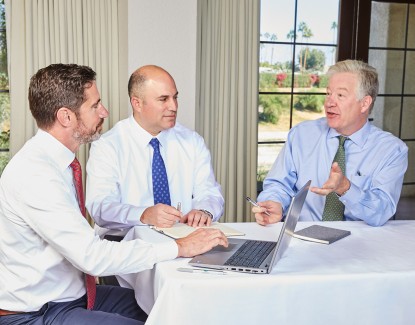The Importance of Remaining Long-Term Investors in Today's Equity Markets
The Hennessy Focus Fund Managers discuss a recently added position, how they currently evaluate “tail risk,” select holdings trading at exceptionally low valuations and O’Reilly Automotive’s expansion plans.
-
 David Rainey, CFACo-Portfolio Manager
David Rainey, CFACo-Portfolio Manager -
 Brian Macauley, CFACo-Portfolio Manager
Brian Macauley, CFACo-Portfolio Manager -
 Ira Rothberg, CFACo-Portfolio Manager
Ira Rothberg, CFACo-Portfolio Manager
Have you made changes to the portfolio during the recent volatility?
As long-term investors with a multi-year time horizon, we try not to overreact to short-term market movements. We believe price volatility is the friend of the long-term investor as it provides the opportunity to add to positions at attractive valuations. Throughout the Fund’s long history, we have invested in companies that we believe can compound returns at a mid-teens rate over an extended time frame. We are patient investors willing to accept short-term volatility in exchange for higher long-term return potential.
During the second quarter we added a new position in Fastenal Company at about 1% of assets. Fastenal is a broadline distributor of industrial products including fasteners, safety products, hardware, cutting tools and much more. In our view, the company has a great culture, clear competitive differentiation, and best in class financials. Fastenal employs a distribution system and store network allowing it to deliver parts to customers on a same-day or next-morning basis compared to next-day or second-day for most other maintenance, repair, and overhaul (MRO) distributors. This can make the difference between keeping a manufacturing line up and running or having it shut down for several shifts while waiting for a critical part to arrive. This has enabled the company to grow rapidly and deliver about 15% compounded returns over the last decade. More recently, the company introduced a new service offering—placing stores inside key customer plants—that allows it to grow sales nearly 5-fold with those customers. Our research leads us to believe that this solution has broad appeal, and is hard for customers to replicate, so it sets up the company for attractive growth over the next decade.
Can you describe your investment strategy and risk assessment and any changes made in today’s environment?
In the Hennessy Focus Fund, we seek to identify secular growth businesses with the potential to produce sustained mid-teens or better earnings growth purchased at a discount to the business’s intrinsic value. Our intensive research process is focused on five key investment criteria which help us identify high-quality businesses with a large growth opportunity, excellent management, discount valuation, and low “tail risk.” A company with low “tail risk” can be viewed as one that has an easily understood business model, considerable financial strength, and low risk of future operating disruption leading to a permanently impaired business model.
Our approach has remained the same in today’s environment, but we have expanded the scope of our “tail risk” analysis to consider a pandemic or 100-year storm, to better understand the financial strength of the business in light of extraordinary circumstances. We have evaluated how each company would be affected by a massive change in demand, not just a slower downward trend typically seen in a more normal recessionary environment. Specifically, we focus on a company’s cash creation process, its level of cash reserves, absolute leverage and near-term debt maturities.
We believe our current holdings have the financial strength to withstand today’s volatile demand environment and we will continue to monitor our holdings with a focus on liquidity and earnings quality.
Are there examples of holdings trading at significant discounts to historical valuations?
A number of portfolio companies, in our view, are trading at exceptionally attractive prices, and we see catalysts and growth opportunities that could quickly propel stock prices back to multiples seen prior to the pandemic:
American Woodmark is one of the largest kitchen manufacturers in the U.S. with a strong franchise serving the new home construction market and Home Depot and Lowe’s. The stock was one of the hardest hit in 1Q but rebounded strongly in 2Q. We anticipate the stock price will continue to perform well due to:
1) a rise in new home construction fueled by record low mortgage rate, the Millennial generation entering key home buying years, and COVID-19 triggering apartment dwellers to seek single family homes; and
2) surging demand for the company’s in-stock product line offering at Home Depot as the stay-at-home orders spur homeowners to take on do-it-yourself remodeling projects.
Encore Capital Group is the largest buyer of charged-off credit card debt in the U.S. and UK. The global pandemic has caused the unemployment rate in the U.S. to spike to 11.1% in June 2020. The credit charge-off rate has historically been highly correlated with
unemployment rates and is anticipated to increase from 3.6% pre-pandemic to more than 10%—a level last seen during the global financial crisis. With a limited number of buyers of freshly charged-off credit card paper and an influx of supply, prices of portfolios could decline by 25%. We believe Encore has one of the strongest balance sheets in its industry and one of the most efficient collections platforms, and therefore, has the potential to deploy capital at excellent returns.
Markel Corp is a specialty insurance company with important investments in public equities and control positions in private businesses. The company has been referred to as a “baby Berkshire Hathaway,” which we believe is an apt comparison due to their similar management philosophy and business mix. Many companies in the insurance industry have lower margins with a single digit return on equity (ROE). Markel, however, has generated attractive returns for many decades because of their strong and disciplined underwriting culture and excellent equity investment returns. In the first quarter, Markel saw declines in its equity portfolio and recorded a reserve addition due to expected Covid-19 related losses leading to a decline in book value. We believe these events will prove to be temporary setbacks due solely to the pandemic. Missed in this frenzied environment is that Markel is enjoying significant pricing power in the majority of its insurance markets. This “hard market” in their specialty lines of insurance could power strong underwriting results for years to come and sustained growth in book value per share.
Would you please discuss O’Reilly Auto Parts’ future expansion plans?
In late 2019, O’Reilly Auto Parts acquired Mexico-based Mayasa Auto Parts, its first expansion outside the U.S. We believe this acquisition demonstrates the company’s larger aspirations to grow beyond being strictly a domestic auto parts retailer and distributor. While Mayasa only has about 20 corporate stores, the company also distributes to more than 2,000 independent jobbers in 28 Mexican states.
In Mexico, the auto parts market is highly fragmented; with AutoZone claiming title to the largest chain with about 600 stores and few other chains of any size. We believe that O’Reilly can open more than 600 stores in Mexico over time as it takes market share from small, independent jobbers. While Mexico has only 50 million vehicles compared to 285 million in the U.S., Mexico has similar makes and models to the U.S., allowing O’Reilly to leverage its buying power across borders. Importantly, O’Reilly’s international expansion plans go beyond Mexico, with plans to expand into Canada in the short to intermediate-term. Over the long-term, we believe the company can add significant value to acquisitions outside of North America.
- In this article:
- Domestic Equity
- Focus Fund
You might also like
-
 Portfolio Perspective
Portfolio Perspective
Focus FundSeeking Companies with Strong Growth at Attractive Valuations
 David Rainey, CFACo-Portfolio Manager
David Rainey, CFACo-Portfolio Manager Ira Rothberg, CFACo-Portfolio Manager
Ira Rothberg, CFACo-Portfolio Manager Brian Macauley, CFACo-Portfolio ManagerRead the Commentary
Brian Macauley, CFACo-Portfolio ManagerRead the CommentaryThe Portfolio Managers rely on their strategy of owning durable, well-run businesses capable of turning adversity into opportunity and adapting to macroeconomic surprises. The following Hennessy Focus Fund Commentary recaps the 2025 market and highlights areas of opportunity ahead.
-
 Portfolio Perspective
Portfolio Perspective
Focus FundFrom Rate Cuts to AI: Positioning the Portfolio for Potential Opportunity
 David Rainey, CFACo-Portfolio Manager
David Rainey, CFACo-Portfolio Manager Ira Rothberg, CFACo-Portfolio Manager
Ira Rothberg, CFACo-Portfolio Manager Brian Macauley, CFACo-Portfolio ManagerRead the Commentary
Brian Macauley, CFACo-Portfolio ManagerRead the CommentaryThe Portfolio Managers discuss holdings that could potentially benefit from lower rates, tariffs, and artificial intelligence (AI). The team also provides an update on AST SpaceMobile and discusses potential opportunities in select Technology and Health Care companies.
-
 Company Spotlight
Company Spotlight
Focus FundO’Reilly Automotive—Revved for Growth
 David Rainey, CFACo-Portfolio Manager
David Rainey, CFACo-Portfolio Manager Ira Rothberg, CFACo-Portfolio Manager
Ira Rothberg, CFACo-Portfolio Manager Brian Macauley, CFACo-Portfolio ManagerRead the Spotlight
Brian Macauley, CFACo-Portfolio ManagerRead the SpotlightO’Reilly Automotive is a leader in the automotive aftermarket parts industry in the U.S. The company’s scale, unique distribution infrastructure, and customer service-oriented culture should allow it to take market share in a fragmented U.S. market for years to come.
